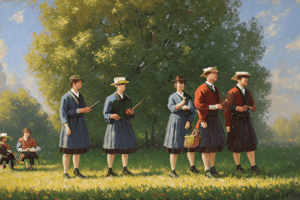Podcast
Questions and Answers
Which scholar's work primarily contributed to the foundation of behavioural theories?
Which scholar's work primarily contributed to the foundation of behavioural theories?
- Pavlov (correct)
- Piaget
- Bruner
- Skinner (correct)
In the context of cognitivism, which of the following is considered essential for learning?
In the context of cognitivism, which of the following is considered essential for learning?
- Teacher-centric demonstrations
- Reinforcement through external stimuli
- Observation of peers
- Mental and psychological processes (correct)
What does the term 'andragogy' refer to in the context of adult learning?
What does the term 'andragogy' refer to in the context of adult learning?
- A psychological approach for early childhood development
- The theory of child education methods
- The process involved in teaching youth and adolescents
- The methods of leading adult learners (correct)
What role do punishers play in behavioural learning theories?
What role do punishers play in behavioural learning theories?
Which characteristic is NOT typically attributed to adult learners?
Which characteristic is NOT typically attributed to adult learners?
In what way do adult learners differ from child learners according to the principles of andragogy?
In what way do adult learners differ from child learners according to the principles of andragogy?
What is the main focus of educators according to the behavioural theories?
What is the main focus of educators according to the behavioural theories?
Which process is not typically associated with cognitivism?
Which process is not typically associated with cognitivism?
How are adult learning theories mainly derived?
How are adult learning theories mainly derived?
Which of the following statements best aligns with the understanding of adult learners in andragogy?
Which of the following statements best aligns with the understanding of adult learners in andragogy?
Flashcards are hidden until you start studying
Study Notes
Adult Learning Theories
- Andragogy is the study of adult learning, contrasting with pedagogy, the study of child learning.
- Adults are uniquely motivated, experienced, and oriented towards learning compared to children.
- Many principles of andragogy are similar to pedagogy, suggesting a continuous learning process across life stages.
- Adult learning theories are rooted in educational psychology theories of learning.
Characteristics of Adult Learning
- Adults are independent and self-directed in their learning.
- Adults bring diverse levels of experience to learning situations.
- Adults integrate learned information into their everyday lives.
- Adults prefer immediate problem-centered learning approaches.
- Adults are motivated by internal factors more than external ones.
- Adults value mutual respect in learning environments.
Instrumental Learning Theories
- Instrumental learning encompasses behavioral, cognitivism, and experiential learning theories.
Behavioral Theories
- Scholars: Thorndike (1911), Watson (1913), Pavlov (1927), Skinner (1954).
- Focus on how external stimuli influence individual behavior change.
- Positive reinforcement strengthens behaviors and enhances learning, while negative punishment weakens them.
- Educators control the learning environment to achieve specific responses, promoting a teacher-centered approach.
- Application: In medical, health, and pharmacy education, teachers model desired behaviors, and learners observe and are evaluated using scoring rubrics to reinforce learning.
Cognitivism
- Scholars: Piaget (1952), Bruner (1966).
- Focuses on internal cognitive structures and processes of the learner rather than external environment.
- Learning primarily occurs in formal education through verbal or written instruction, aimed at accumulating explicit and identifiable knowledge.
- Learning involves mental processes like perception, reflection, motivation, memory, and metacognition.
- Application: In professional healthcare education, technology-based learning focuses on self-direction and self-assessment. Continuous Professional Development (CPD) programs support lifelong learning.
Transformative Learning Theories/ Critical Reflection
- Scholar: Mezirow (1978, 1990, 1997).
- Emphasis on transforming meaning, context, and long-standing propositions.
- Learners identify and challenge the validity of their embedded assumptions or "frames of reference."
- Integration of new knowledge into existing knowledge is central to learning.
- Learners maintain their original assumptions but challenge and change some perspectives, beliefs, and prior assumptions.
- Application: In health professional education, critical incident analysis and group discussions encourage learners to reflect on assumptions, share ideas, and examine reflective practices.
Reflective Models
- Scholar: Schön (1987).
- Reflection on action: Learners evaluate the relevance or rigor of their activities, views, and processes after they occur.
- Reflection in action: Reflection on the difference between previous knowledge and new experiences during the activity, leading to self-testing of knowledge through investigation.
- Educator feedback on reflective practices helps learners identify strengths, weaknesses, and learning needs.
- Application: In professional healthcare education, reflective models facilitate the development of reflective practices and learning systems, enhancing knowledge and skills.
Social Theories of Learning
-
Zone of Proximal Development, Vygotsky (1978)
-
Situated Cognition, Lave and Wenger (1991)
-
Communities of Practice, Wenger (1998)
-
These theories integrate behavioral modeling with cognitive learning.
-
Learning facilitators include social interaction, the individual, context, community, and desired behavior.
-
Teachers provide supportive learning environments and clarify expected behaviors.
Constructivism
- Scholars: Ausubel (1968), Piaget (1952), Vygotsky (1978).
- Individuals perceive, interpret, and explain the same object differently, constructing new knowledge through interaction with prior knowledge.
- Constructivism comprehensively focuses on internal cognitive mechanisms and social interaction.
- The teacher serves as a facilitator, guiding learners using student-centered instruction, promoting active learning.
- Application: In professional healthcare education, constructivist methods like group discussions, journal clubs, problem-based learning, and team-based learning encourage application of concepts in real-world situations through recontextualization.
Learning Outcomes
- Define learning and learning theories.
- Explain the significance of studying learning theories.
- Appreciate the differences between adult and child learning.
- Discuss the characteristics of each learning theory that distinguish it from others.
- Identify the scholars who originated and developed each learning theory.
- Indicate the role of the educator during the application of each learning theory.
Studying That Suits You
Use AI to generate personalized quizzes and flashcards to suit your learning preferences.




